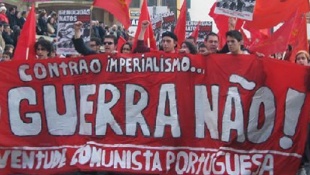Article by Américo Costa,
member of the Central Committee and of the PCP’s National Commission
for Trade Unions about the General Strike held in Portugal.
General Strike – brief notes
The General strike culminated, but did not end, the whole process of contestation
of the government which had a great expression during 2002, namely during the
second half of the year; it was the rejection by the workers, and in a way by
large strata of society, repudiating the negative and class policies of the
right-wing government (PSD/CDS-PP), of important matters such as the attack
on the National Health Service, the Social Security Law, the Labour Code (better
known as the Labour Package), the law of the supernumerary, the change in the
statute of the retirement of the Public Administration workers, the rise in
the cost of living or the objective reduction of the wages and pensions, all
of this determining the strongest offensive against the rights of the workers
since the 25th April (1974) and making them the main target of this government
which, at the same time does everything to consider programmatically, and through
the Budget, the demands the employers have been pressing for decades.
The Strike (the fourth General Strike since the 25th of April) had a very high
participation, one million seven hundred thousand workers according to CGTP;
it included all sectors of activity, the public and the private, in many cases
with 100% participation, leading us to consider that it constituted a remarkable
answer of the Portuguese workers, who, united in action, unequivocally condemned
the Labour Package and the policies of the PSD/CDS-PP government and demand
fairer social policies. And its meaning is all the more significant considering
the manoeuvres of intimidation by the government and the big employers, questioning
the right to strike by trying, on the eve, to illegitimately impose “minimum
services” in the transportation area; using the Republican Guard and Police
against the strikers, pressures and threats in several companies, particularly
against non-union workers and those with precarious labour links.
Furthermore, labour minister Bagão Felix had already “decreed”
before the strike that there would be no General Strike; in his opinion, and
at best, there would be a partial strike because UGT (reformist Trade Union
Central) had not joined; this argument comes in contraction with government’s
intentions and strong measures to minimize or prevent the Strike; and, reaffirming
preconceived intentions, the minister analysed the Strike not based upon what
it really was – that is the number of those who participated – but
based upon those who did not strike or allegedly were not able to work because
of the strike in transport.
The Portuguese male and female workers gave a magnificent lesson in dignity,
unity in action, determination and struggle in defence of their rights.
The General Strike and its success is not dissociable from the correct evaluation
of the fighting disposition of the masses and the choice of the right moment
for its call, this great struggle presented a complex and persistent path to
the workers and their class organizations; from the beginning an intense work
of explanation, fixation of mobilizing and agglutinating objectives of the several
strata of workers, but the high class conscience demonstrated was truly decisive
in the success of the Strike.
It is fair to say that on the level of the general political action and also
on the institutional level, the PCP has got the start of the struggle against
the right-wing policies and the Labour Package; it intervened in the explanation
about the Labour Package’s nature and it supported the CGTP’s decision
of General Strike. The Party’s organisations in the companies, the communist
labour activists and in general all the Party members have been in the struggle
by the side of the other parties’ workers or the workers without party,
giving thus a decisive contribution to the success of the Strike.
This success sends the government a message that is of a relevant national
interest: the government will have to listen and heed instead of insisting on
arrogance and autism.
The message, that there is no national progress based upon a declared war against
the workers and their rights, interests and aspirations.
The message, that it is imperious to abandon the Labour Package and its lines
of force.
The message that it is imperious to pursue a profound reversal in the policies
of striking social injustice the government is engaged in.
The labour world will not stand to be – and will not be – the underdog
of national life and the main victim of a government policy servile to the interests
and privileges of the powerful and, conscious of its legitimate rights and unalienable
dignity, demands for itself the role of being the essential force in building
a fairer and more developed Portugal
